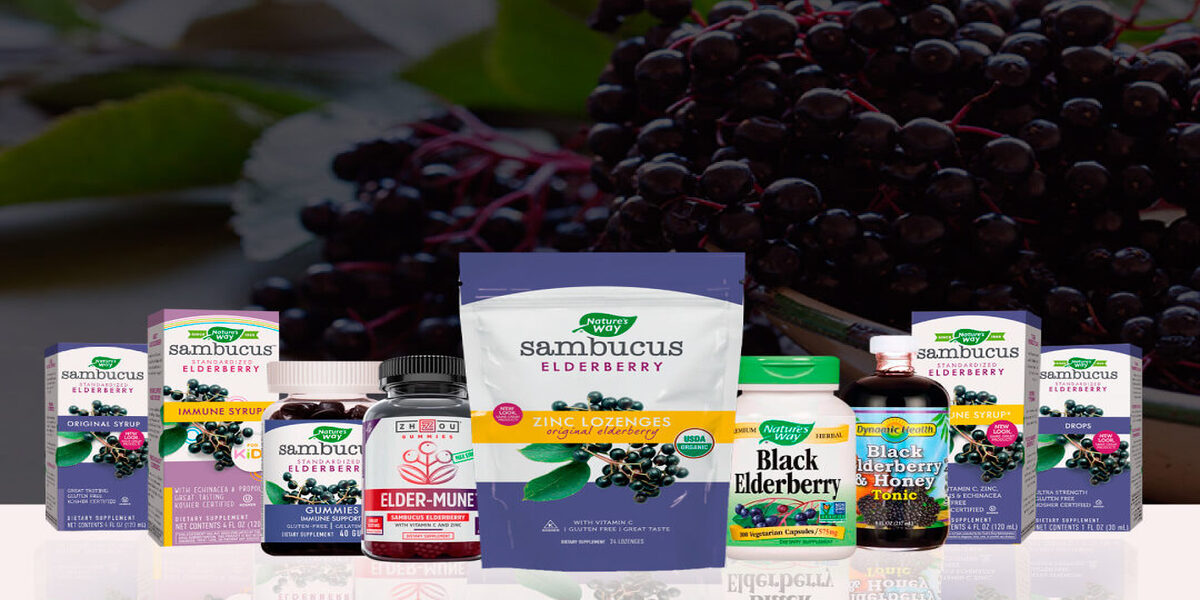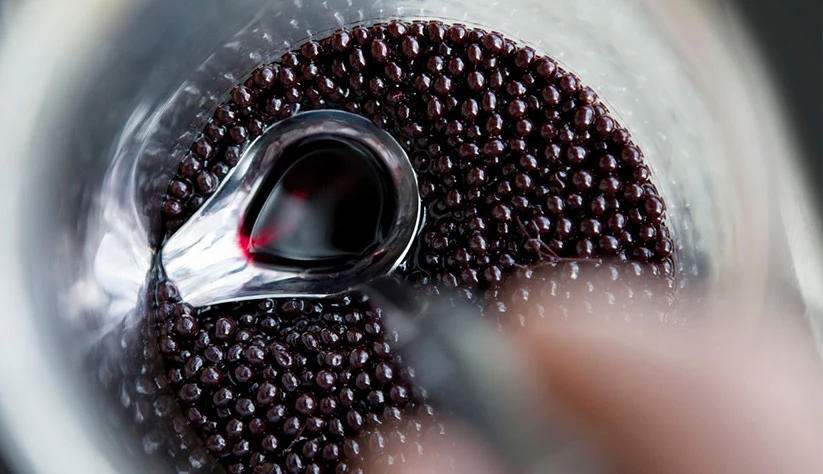
Elderberry, the dark purple fruit of the elder tree, has been used for centuries for its medicinal properties. From ancient times to the present day, elderberry has been revered for its potential health benefits, culinary uses, and even its role in folklore. It has recently grown in favour as a natural medicine due to its outstanding health advantages and numerous applications. Elderberry is thought to increase immunity, alleviate cold and flu symptoms, and address a variety of health issues.

What Is Elderberry?
Elderberry refers to the dark purple-black berries of the elder tree, also known as Sambucus nigra. The elder tree is native to Europe, North Africa, and parts of Asia, although it also grows in North America. The elderberry plant, which belongs to the Adoxaceae family, is a deciduous shrub or small tree that thrives in moist habitats like riverbanks and woodlands. The elder tree produces white blooms in late spring or early summer, which mature into small, dark fruit clusters in late summer or early fall. The ripe berries are small and spherical, and they range in colour from deep purple to black. They have a sour flavour and are not typically eaten raw. Elderberries are often utilised after being boiled or processed. The flowers and leaves have long been used to relieve pain, reduce swelling and inflammation, increase urine production, and induce sweating. The bark of the plant was used to induce vomiting by acting as a diuretic and laxative. In traditional medicine, elderberry juice or dried berries are used as a laxative and diuretic, as well as to cure the flu, infections, sciatica, headaches, dental pain, heart discomfort, and nerve pain.
Nutritional Profile of Elderberries.
Vitamin C: Elderberries are an excellent source of Vitamin C, with a modest serving providing a considerable amount of the daily requirement. A cup of elderberries has 52 mg of Vitamin C, which is 57% of the recommended intake. Vitamin C supports the immune system, protects the body from free radicals, and promotes skin health.
Vitamin A: Elderberries contain a high concentration of beta-carotene, a precursor to Vitamin A, which is necessary for good skin, vision, and immunity.
Anthocyanins: Elderberries get their rich purple-black colour from anthocyanins, which are potent antioxidants with anti-inflammatory and immune-boosting qualities.
Quercetin: Elderberries contain quercetin, a flavonoid that has antioxidant and anti-inflammatory properties.
Dietary Fibre: Elderberries are high in dietary fibre, which promotes digestive health, regulates blood sugar levels, and increases feelings of fullness.
Low-Calorie: Elderberries are a nutrient-dense and nutritious complement to a variety of recipes, thanks to their low calorie content.
Health Benefits of Elderberry
- Nutritional Profile:
Elderberries are packed with essential nutrients, including vitamins A, B, and C, as well as antioxidants like flavonoids and anthocyanins. These compounds are known to have immune-boosting properties and can help fight oxidative stress in the body. - Health Benefits:
Immune Support: One of the most well-known benefits of elderberry is its ability to support the immune system. Studies have shown that elderberry extract can help reduce the duration and severity of colds and flu symptoms by stimulating the production of cytokines, which are key players in the immune response.
Antioxidant Properties: Elderberries are rich in antioxidants, which help protect cells from damage caused by free radicals. This can help prevent chronic diseases such as heart disease, cancer, and diabetes.
Anti-Inflammatory Effects: Elderberry has been shown to have anti-inflammatory properties, which can help reduce inflammation in the body and alleviate symptoms of conditions like arthritis and allergies.
Heart Health: Some research suggests that elderberry may help improve heart health by lowering cholesterol levels and improving blood sugar control.

- Culinary Uses:
Elderberries have a tart, slightly sweet flavor that makes them a versatile ingredient in both sweet and savory dishes. They can be used to make jams, jellies, syrups, and sauces, or added to baked goods like muffins and pies. Elderberry tea and elderberry wine are also popular beverages made from elderberries. - Traditional and Folk Uses:
Throughout history, elderberry has been used in traditional medicine to treat a variety of ailments, including colds, flu, fevers, and digestive issues. In folklore, the elder tree was often considered sacred and was believed to have protective properties against evil spirits. - Side Effects and Precautions:
While elderberry is generally considered safe for most people when consumed in moderate amounts, there are some precautions to keep in mind:
Potential Allergic Reactions: Some individuals may be allergic to elderberries or other plants in the elder family. Allergic reactions can range from mild skin irritation to more severe symptoms like difficulty breathing. It’s important to discontinue use and seek medical attention if you experience any adverse reactions.
Toxicity: Raw elderberries contain cyanide-producing compounds, which can be toxic if consumed in large quantities. Cooking the berries thoroughly can help break down these compounds and make them safe to eat.
Drug Interactions: Elderberry supplements may interact with certain medications, including diuretics, laxatives, and immunosuppressants. If you’re taking medication, it’s best to consult with a healthcare professional before adding elderberry to your routine.

Dosage and Uses of Elderberry
Elderberry Syrup
One of the most popular ways to consume elderberries is as syrup. Elderberry syrup is frequently used as a natural treatment for colds and flu. It can be readily made at home by boiling elderberries in water and sweetening with honey. Many commercial elderberry syrups are also available, making them a practical option for those looking to boost their immunity.
Tea & Infusions
Another approach to reap the advantages of elderberry is to make teas and infusions. Elderberry tea is a calming and tasty beverage created by steeping dried berries in hot water. It can be eaten alone or combined with other herbs for additional effects. Elderberry’s distinct flavour and potential health benefits make it a popular choice among herbal tea fans.
Capsules and Supplements
Elderberry is offered as a pill or supplement for individuals who prefer a more convenient option. These products frequently contain concentrated elderberry extracts, making it easy to incorporate elderberry into one’s regular wellness practice. However, selecting renowned brands is critical to ensuring product quality and efficacy.
Tinctures
Elderberry tinctures are a delicious and unique way to reap the benefits of elderberries. These can be mixed into toast, used as a recipe sweetener, or consumed directly for a quick and delightful health boost.
Potential Side Effects and Considerations
Unripe or Raw Berries
Consuming unripe or raw elderberries is not recommended since they may contain nausea-inducing compounds. These substances are eliminated from the berries when they are properly cooked or processed, making them safe for ingestion.
Allergic reactions.
Some people may be allergic to elderberries. Itching, swelling, and difficulty breathing are all signs of an allergic reaction. If you are allergic or have a documented sensitivity to comparable fruits, use caution when trying elderberry products.
Interactions with medications
Elderberry supplements may interfere with immunosuppressive medicines. If you are on any drugs, particularly immunosuppressants, ask your doctor before introducing elderberry into your daily regimen.
Cyanide Concerns
Elderberry seeds and stems contain modest levels of cyanide-producing chemicals. While the levels are usually modest and unlikely to cause harm, consuming large amounts of these parts is not recommended. The risk of cyanide exposure is reduced when elderberries are properly processed, for as by heating or drying.
Elderberry is a versatile and nutritious fruit with a long history of medical and culinary applications. Its immune-boosting benefits, antioxidant content, and anti-inflammatory effects make it an excellent supplement to any balanced diet. However, elderberry should be consumed responsibly and with caution, as there may be negative effects and interactions with drugs. Before using any supplement or herbal remedy, always visit a healthcare expert, especially if you have underlying health concerns or are taking medication.Incorporating elderberry into your diet can be a tasty and healthy approach to improve your overall health. Elderberry is a unique fruit with many benefits, whether consumed as a pleasant treat or utilised medicinally.

This thorough resource gives an overview of elderberry, including its nutritional value, culinary applications, historical significance, and potential adverse effects. Understanding the various features of elderberry allows you to make more informed decisions about incorporating it into your daily routine for better health and wellness.










